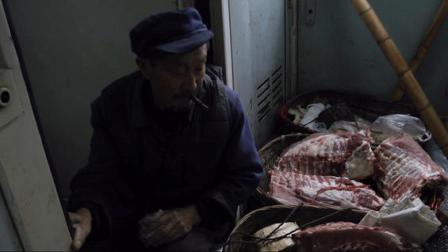Maven's Nest
Reel Life: Flick Pix

Riding on the cinema-train he calls the country of China
By Nora Lee Mandel
THE IRON MINISTRY
Directed by J. P. Sniadecki
Produced by Joshua Neves and J.P. Sniadecki
Released by the dGenerate Collection at Icarus Films
USA. 83 min. Not Rated
In Mandarin with English subtitles
New York Premiere at 2014 New York Film Festival, of Film Society of Lincoln Center
U.S. theatrical release begins August 21, 2015 at Museum of Modern Art, in conjunction with
Cinema on the Edge: The Best of the Beijing Independent Film Festival
Through acute observations and casual conversations, The Iron Ministry seamlessly rides many rails through China to intimately experience the sounds, sights, and even the smells, alongside restless people on the move through space and economic change.
Director J. P. Sniadecki took on a longer and wider space than his co-directed verité features under the visual anthropology aegis of Harvard’s Sensory Ethnography Lab -- Foreign Parts, a portrait of “The Iron Triangle” in Queens, NY (U.S. premiere at 2010 New York Film Festival), and People's Park, a long single-shot stroll in Chengdu, Sichuan (U.S. premiere at 2013 New Directors/New Films). Filmed over the last three years, 2011 – 2013, that the once-mighty Ministry of Railroads operated its own iron fiefdom (and officious, suspicious guards frequently stop his filming, even with just a small hand-held consumer camera), the general direction is less about geography and more through the country’s diversity.
In the opening dark, screeching brakes are heard, then the abstract aesthetics of rails and chains rattle into focus as isolated parts. The geometry of floor patterns and baggage shapes are quickly overwhelmed as people crowd on board. Over the long haul, the cars go from rural areas, where farmers heft colorful loads of fruits and vegetables on ancient bamboo yokes, fishermen squat to gut their fresh catch, and butchers chop meat, to finally the almost empty, quiet comfort of electronic device-tappers in a new bullet train. (Well, as quiet as the barrage of announcements and the train noises allow.) In between, men rest up in berths, or nap against whoever is next to them on the floor, or prop up against a door. Some families bring meals and bags of snacks for their kids; some are enterprising food vendors selling hot noodle soup. Trash is everywhere, and a lone sweeper has a Sisyphean task at the end.
Unlike Lixin Fan’s Last Train Home (2009), where mobs of city factory workers had a single-minded purpose to get back home in the hinterlands for the New Year holiday, these passengers have different pasts, present, and hopeful futures, and during different journeys edited into one long ride, they are curious about their heterogeneity, so we get to hear a rare variety of everyday Chinese voices. Most notable are a couple of proud Mao-quoting Hui Muslims explaining how their thousands-strong community celebrates their holidays to Han Chinese counterparts who are surprised so many of a minority group live in their midst. (Another Muslim man is pushed around by a security guard.) A thoughtful Tibetan softly compares the plight of her people to Native Americans in the U.S. pushed out by an Iron Horse much like this one. Among friends, conversations veer close to politics, as young men josh about the difficulty of ever saving enough money to please a potential mother-in-law, or if the only solution is to emigrate. (For the longer term, researchers estimate that the surplus of male over female births, due to obvious selection, has peaked.)
Unlike verité master Albert Maysles’ posthumously released final film In Transit filmed along one northwestern Amtrak route, there’s little sense here of what’s outside the windows. Though Sniadecki traveled all the major long arteries and many shorter spurs, all are edited together into what he calls one “cinema-train”. Probably because I tend to favor the Ethnography Lab’s more structured graduates, such as Sweetgrass and Manakamana, I felt the brief glimpses outside of views from mountains to thick urban air pollution, plus the lack of maps, frustrating, and makes “the train” seem suspended in an eerie artificiality, with only day and night demarcated. There’s more than an ironic passing resemblance to Bong Joon Ho’s apocalyptic, class-structured Snowpiercer.
Released through the dGenerate Collection, at Icarus Films, known for bringing outstanding contemporary independent films from China to the U.S., particularly documentaries not able to screen at home, The Iron Ministry is opening in conjunction with Cinema on the Edge: The Best of the Beijing Independent Film Festival, that is bringing 18 film programs suppressed by the Chinese authorities (including People's Park) to venues around Manhattan from August 7 - September 13, 2015.
August 21, 2015
Nora Lee Mandel is a member of New York Film Critics Online and the Alliance of Women Film Journalists. Her reviews are counted in the Rotten Tomatoes TomatoMeter:
 Complete Index to Nora Lee Mandel's Movie Reviews
Complete Index to Nora Lee Mandel's Movie Reviews
Since August 2006, edited versions of many of my reviews of documentaries/indie/foreign films are at Film-Forward; since 2012, festival overviews at FilmFestivalTraveler; and, since 2016, coverage of women-made films at FF2 Media. Shorter versions of my older reviews are at IMDb's comments, where non-English-language films are listed by their native titles.
To the Mandel Maven's Nest Reel Life: Flick Pix
Copyright © 2018


